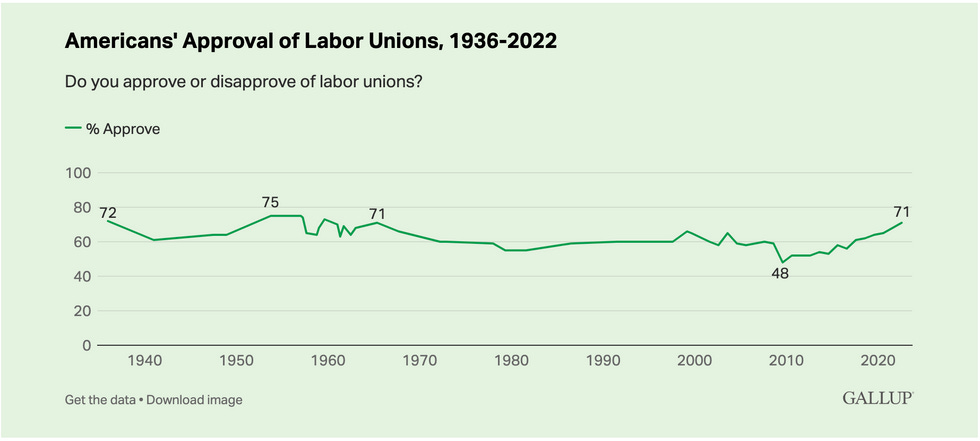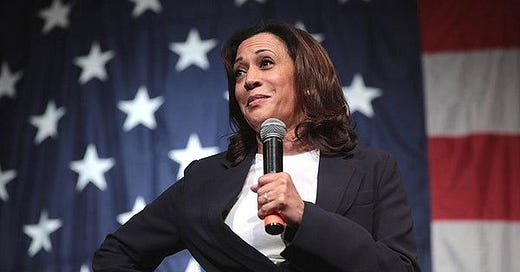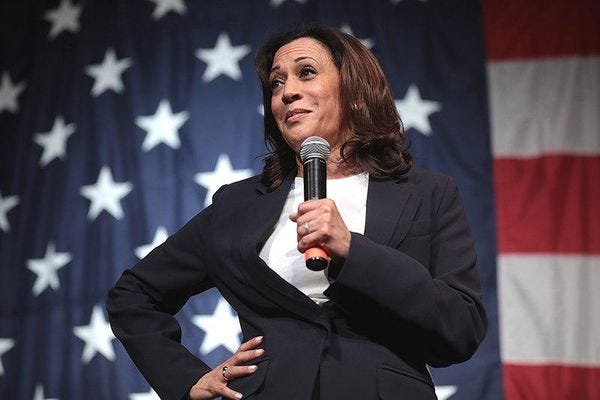
Discover more from Wonkette
For Labor Day this weekend, The Nation ran an interview with Vice President Kamala Harris about the current state of the labor movement and what she and the entire Biden administration are doing to support unions and workers rights. This is a very big deal . Because let's be real here, the anti-union sentiment in this country has run pretty deep since the 1980s, and the administration's open embrace of labor is a reflection of the ways in which that is very quickly changing.
As the very first line of the article notes, 71 percent of the country now has a favorable view of unions, up from a low of 48 percent in 2010.

But Harris said she and President Joe Biden hope to make this the most pro-labor administration ever, and labor leaders agree that they're doing some pretty good work.
Via The Nation
Harris is confident that the work that she and Labor Secretary Marty Walsh are doing on the White House Task Force on Worker Organizing and Empowerment will bear fruit. Union leaders praise the project, which has yielded nearly 70 recommendations for making it easier for workers to organize and engage in collective bargaining—many of which are already being implemented. “Every union person that you would talk to would tell you the same thing: that we’re pinching ourselves at how seriously the Biden-Harris administration takes these issues,” explained United Steelworkers Vice President Roxanne Brown, a key member of the AFL-CIO executive council. “What the vice president and Secretary Walsh are doing right now is huge. It’s historic.”
She also addressed the way the pandemic has affected the labor movement.
“There’s so much about the pandemic that, I think, really highlighted for all to see what some of us have known to be the fractures and the fissures and the failures of systems—including the systems that should support working people but don’t,” she said. “We saw, for example, at the height of the pandemic, that 2 million women had to leave the workforce because a real issue for all workers is child care. How many people had to leave the workforce because they didn’t have paid sick leave? Or paid family leave? We saw how many workers were taking so much risk into their hands—especially those frontline health care workers who, through their sheer commitment, were going to work because they care about saving lives. Think about what that meant in terms of a workplace that may not be safe. Think about it in terms of teachers and other frontline workers.”
The term “essential worker” was a catchphrase for the media as the pandemic unfolded. But it resonated with the people who were putting their lives on the line . “Workers started realizing their value and started demanding that the dignity of their work would be respected in every way, including through their wages and benefits,” Harris said.
It's true. As we've said many times here. the pandemic essentially performed the same function a general strike was always meant to do. Since the 1830s, labor activists have theorized that if every working class person stopped working, it would demonstrate to society how much they rely on that labor, leading to a more pro-worker transformation of society.
But "because the internet," the thing people glommed onto was the fact that Harris said she didn't eat a grape until her 20s because of the grape boycott.
Growing up in California in the late 1960s and early ’70s, with a mother who was “very deeply rooted” in the movements for economic, social, and racial justice, the vice president was inspired by Cesar Chavez, Delores Huerta, and the United Farm Workers , which used grape boycotts to force growers to negotiate. “The farmworkers movement was very much a part of my childhood,” she recalled. “This sounds quaint, and so I’m reluctant to say it, but, you know, I didn’t eat a grape until I was in my 20s. Like, literally, had never had a grape. I remember the first time I had a grape, I went, ‘Wow! This is quite tasty.’ It was absolutely ingrained so deeply in me: Never cross a picket line.”
The responses to the article on Twitter are full of people calling her a liar, both because people seem to not believe anyone was really boycotting grapes and because the Delano grape boycott ended in 1970, when she was six.
“https: //t.co/ggbwQXoumC”
— Ben Shapiro (@Ben Shapiro) 1662468908
“@ArthurBoreman @JoshKraushaar and she lived in Illinois from 1966 to 1970, not Cali”
— Josh Kraushaar (@Josh Kraushaar) 1662461409
I was not allowed to eat grapes either when I was a kid [Editrix here: Me too!] , and I was obviously born well after the Delano Grape Strike (unless I am an immortal vampire, which is a possibility). Why was this, you ask? Because there was another grape boycott, in the 1980s, also led by Cesar Chavez and the United Farm Workers, over the toxic pesticides that were being used on grapes.
That was the third boycott, by the way. The first was until 1970, then, three years later, it started again. That one went on until 1977. So really, for most of Harris's young life, there were grape boycotts going on.
Now, I will tell you — I did eat a grape! I totally did. It was on a trip to the Bronx Zoo and I was 3 or 4 and I remember absolutely nothing about that trip or the zoo other than that we were on a bus and one of my aunt's friends gave me grapes and I was delighted . In my defense, I was a child and didn't fully understand what a migrant worker even was. I don't remember when we were allowed to have grapes, but it was admittedly well before that boycott officially ended in the year 2000 — a fact I am literally just finding out today.
The New York Post, going so far as to put out an entire article titled "Kamala Harris claims to eat 1st grape in her 20s over labor boycott, but there’s a wrinkle in dates," does mention this, but claims that it still makes her a lying liar, because she "crossed a picket line" because she ate a grape before the year 2000 ... which is petty as hell.
“Weird fact check: Kamala Harris said in Labor Day interview she first tried grapes in her 20s because she would 'never cross a picket line' Problem with story: UFW grape boycott was in effect when Harris was 19-36. VP's office has yet to clarify https://t.co/In59c2Fyrj”
— Steven Nelson (@Steven Nelson) 1662411695
Like, congratulations on being able to Google, but the fact is, even the union themselves were not really pushing the boycott in the later years and because of that, most people (myself included!) kind of just assumed it was over.
As the LA Times noted in 2000:
It was in 1984 that the UFW leadership launched the third and longest grape boycott, one that never had the focus or public support of its predecessors. The union shifted the target of the strike--first urging Gov. George Deukmejian to improve enforcement of the farm labor law, then demanding more contracts with grape growers and, finally, concentrating on the pesticide issue.
At age 61 Chavez conducted his longest public fast--the 36-day “Fast for Life"--and continued to press the boycott until his death five years later in 1993.
The third boycott initially was promoted in UFW mailers to millions of households, but it never evoked the door-to-door spirit of its predecessors. Over the years, the union devoted progressively less attention to the boycott. Even some activists weren’t sure if the ban on grapes remained in place.
“One boycott is on and the other is off. It’s constantly shifting,” said Phil Martin, a professor of agricultural economics at UC Davis. “It becomes too complicated for the average person to figure out.”
Also, participating in a boycott isn't like being a vegetarian. The issue is that you can't buy the thing, not that you can't eat it. Because it's about not giving your money to the business or corporation that is doing the thing that is wrong. It wouldn't have been an actual violation of the boycott if she had eaten one grape someone else bought or on a bus trip to the Bronx Zoo.
It's sad that people want so desperately to catch someone in a "lie" that they will just ignore everything they said in a long ass interview and focus exclusively on one line they think they can play internet detective on. The important part of the article isn't the specific timeline and circumstances under which Kamala Harris ate a grape one time, but that people are starting to get back to a place where worker's rights are taken more seriously and that this is being reflected in efforts by the current administration — which is exactly what we should want them to be doing.
Do your Amazon shopping through this link, because reasons .
Wonkette is independent and fully funded by readers like you. Click below to tip us!











